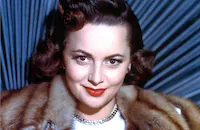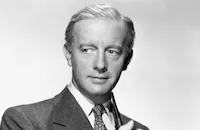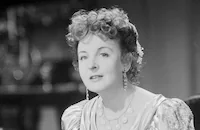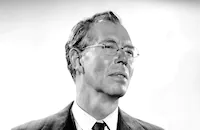To Each His Own

Brief Synopsis
Cast & Crew
Mitchell Leisen
Olivia Dehavilland
Mary Anderson
Roland Culver
Phillip Terry
Bill Goodwin
Film Details
Technical Specs

Synopsis
During World War II, while London endures New Year's Eve during a blackout, Jody Norris, a middle-aged American woman, turns down a date with another lonely Londoner, Lord Desham, to meet a train. Onboard is Lieutenant Gregory Pierson, the son of Jody's friends from her hometown, Pierson Falls. While she waits, Jody recalls the summer of 1918, just before the end of World War I, when she was a very young woman: When Jody turns down a proposal from Lieutenant Alex Pierson, he proposes to Corinne Sturges. That night, Jody falls in love with a young flier, Captain Cosgrove, and makes love with him, even though she knows he is in town only for a few hours. Soon Jody discovers that she is pregnant and is told by a doctor that for her own safety, she must terminate the pregnancy. When she learns that Cosgrove has been killed in battle, Jody decides to keep the baby. After Jody secretly gives birth to a son, Daisy Gingras, her nurse, gives the baby to Jody's neighbor Belle Ingham, saying that the infant is a war orphan, so that Jody can offer to adopt him without scandal. Belle, however, gives the baby to Corinne, whose own baby has just died, and he is named Gregory. Heartbroken, Jody visits the baby frequently and nicknames him "Griggsy." After her father dies and Jody sells their family drugstore, she asks Corinne to hire her as Griggsy's nurse. When Corinne refuses, Jody shows her Griggsy's birth certificate and confesses that he is her son. Corinne refuses to give up Griggsy, because Alex is still in love with Jody. Jody moves to New York and builds a successful cosmetics business with her friend Mac Tilton, who loves her. Jody tells him she has a young son, and he again proposes, but she turns him down. Meanwhile, she continues to see Griggsy when he and Alex come to New York. When she learns that Alex and Corinne are nearly bankrupt, Jody blackmails Corinne into giving up Griggsy in exchange for a loan. After two months with Jody, Griggsy longs to be home with Corinne, and when Jody tells him Corinne adopted him, he becomes hysterical and says that his mother already told him about it and loves him best because she chose him. Heartbroken, Jody returns Griggsy to the Piersons and goes to London to immerse herself in work. Back in the present, Jody introduces herself to Griggsy and offers him a place to stay, hoping to finally have a week alone with him. His mind is on getting married while on leave to his girl friend, Liz Lorimer, however, and Desham makes arrangements for a wedding ceremony that night. After Desham intimates to Griggsy that Jody is more than just a kind benefactor, Liz tells Griggsy that Jody acts as if he were her own son. Griggsy finally realizes who Jody is, and calling her "mother," asks her to dance.

Director

Mitchell Leisen
Cast

Olivia Dehavilland

Mary Anderson

Roland Culver

Phillip Terry

Bill Goodwin

Virginia Welles
Victoria Horne

Griff Barnett
Alma Macrorie
Bill Ward
Frank Faylen
Willard Robertson
Arthur Loft
Virginia Farmer

Doris Lloyd
Clyde Cook
Ida Moore
Mary Young

John Lund
Sandra Brodheim
Sharon Brodheim
Chester Clute
Crane Whitley
Leyland Hodgson
Reginald Sheffield
Will Stanton
Joy Harington
Harlan Briggs

Walter Baldwin
Gladys Blake
Charles Mcnaughton
Patrick O'moore

Billy Gray

Gary Gray

Gigi Perreau

Anthony Caruso
Max Wagner
Jimmy Dundee
William Hunter
Jack Clifford
Betty Farrington
Isabel Withers
Clara Reid
John Rogers

James Millican
Dick Winslow
George Carleton
Anne Curson
Ottola Nesmith
George Kirby
Gary Delmar
Gordon Arnold
Reed Porter
Lee Bennett
Henry Vroom
Joe Guccione
Paul Oman
Anthony Marsh
Douglas Carter
Almeda Fowler
Howard Gardiner
Herbert Evans
Alan Schute
Frank Baker
Bruce Carruthers
Phyllis Adair
Bobby Barber
Bobby Hale
John Meredith
Eleanor Taylor

Mary Maclaren
Sidney D'albrook
Lillian West
Lew Short
Dorothy Vernon
Stella Lesaint
Jean Andren
George Broughton
Richard Woodruff
Tony Ellis
Wilson Benge
Reginald Simpson
Beverly Thompson
Lucy Knoch
Mary Jane Hodge
Gloria Williams
Julia Faye
Nolan Leary
Crew
Roland Anderson
Haskell Boggs
Charles Brackett
Charles Brackett
Charles Brackett
Sam Comer
John Coonan
John Cope
Hans Dreier
Farciot Edouart
Daniel L. Fapp
Loyal Griggs
Edith Head
Devereux Jennings
Gordon Jennings
Mitchell Leisen
Paul Lerpae
Alma Macrorie
Don Mckay
Helen Gladys Percey
Dorothy Robinson
Jacques Thery
James M. Walters
Wally Westmore
Philip G. Wisdom
Victor Young

Videos
Movie Clip



Hosted Intro
Film Details
Technical Specs

Award Wins
Best Actress
Award Nominations
Best Writing, Screenplay
Articles
To Each His Own
To Each His Own was a triumph for de Havilland in more ways than one. She had been off the screen for two years due to her legal battle seeking to end her contract with Warner Brothers. It was a battle she won, resulting in a law called the "de Havilland Decision" that limited studios to a seven-year contract with an actor. To Each His Own offered de Havilland a bravura star turn for a spectacular comeback.
Mitchell Leisen had directed de Havilland in Hold Back the Dawn (1941), which had earned her an Academy Award nomination. When de Havilland read the script for To Each His Own, she knew that only Leisen could make it more than a conventional soap opera. Leisen didn't want to do it, but de Havilland wouldn't do it with anyone else. So Leisen worked with writer-producer Charles Brackett to improve the script, and agreed, unenthusiastically, to direct. De Havilland remembered that as production went on, and he discovered more facets to the character, Leisen became more enthusiastic. She credited Leisen's attention to detail for her performance, whether it was making sure the period costumes, props and furniture were correct, giving her insight on a line reading or gesture, or setting the tension of a scene. Always, she said, Leisen kept the entire picture in mind, and modulated her performance to fit the rhythm of the whole. And de Havilland had some tricks of her own for getting in character. She used different colognes for each different era of Jody's life, from young girl to middle-aged executive. When she put on cologne, she was able to evoke the emotions that Jody was feeling at that time in her life.
De Havilland had caught a tropical disease while entertaining the troops in the Pacific, and had lost a lot of weight when production began on To Each His Own. Since the film was shot in sequence, the weight loss worked to its advantage. In the early scenes, playing a young girl, she is thin and ethereal. Leisen insisted that De Havilland eat hearty meals during production, and over the course of the film, she gained about 20 pounds, which took her effectively through pregnancy and aging. The aging process was also helped along with makeup and harsh lighting.
Broadway actor John Lund made his film debut in To Each His Own, in the dual role of de Havilland's lover and her son. As the son, he had a brown rinse on his naturally blond hair, and his manner for each character is totally different. Lund was a good actor, but was not used to film technique, and had difficulties hitting his marks. The supporting cast, though not well-known, was uniformly excellent, and even inspired. Editor Alma Macrorie, who was not an actress, was a standout as the continually pregnant Belle Ingham. She also cut the film, and kept trying to cut her part down.
By the time To Each His Own wrapped, Mitchell Leisen was so convinced that de Havilland was giving an Oscar-worthy performance that, at the wrap party, he gave her a charm bracelet with an Oscar on it. She wore the bracelet on Oscar night, when she collected her award. Charles Brackett was also nominated for his screenplay.
Producer: Charles Brackett
Director: Mitchell Leisen
Screenplay: Charles Brackett, Jacques Thery, based on a story by Brackett
Editor: Alma Macrorie
Cinematography: Daniel Fapp
Costume Design: Edith Head
Art Direction: Hans Dreier, Roland Anderson
Music: Victor Young
Principal Cast: Olivia de Havilland (Miss Josephine Norris), John Lund (Capt. Bart Cosgrove/Gregory Piersen), Mary Anderson (Corinna Piersen), Roland Culver (Lord Desham), Phillip Terry (Alex Piersen), Bill Goodwin (Mac Tilton), Virginia Welles (Liz Lorimer), Griff Barnett (Mr. Norris), Alma Macrorie (Belle Ingham).
BW-122m. Closed captioning.
By Margarita Landazuri

To Each His Own
Quotes
Trivia
Notes
The foreword to the film states: "The most mysterious mysteries are people, and usually people who don't seem mysterious at all. Take Miss Norris, for instance. Here she is, a middle-aged American woman, walking down a London street on a blacked-out New Year's Eve...." This film marked the motion picture debut of stage actor John Lund and the American film debut of British actor Roland Culver. Hollywood Reporter news items list Frank Craven, Jean Sullivan and Ralph Dunn in the cast, but their appearance in the final film has not been confirmed. Alma Macrorie, the film's editor, also appeared in the picture. The New York Times review of the film states: "Olivia de Havilland...may now take her exalted place alongside Helen Hayes, Ruth Chatterton and Bette Davis as a tragic heroine who loved unwisely and suffered terrible consequences with heroic fortitude."
According to information in the MPAA/PCA Collection at the the AMPAS Library, the PCA did object to the film's "happy ending" of Griggsy meeting his mother, stating that it was unacceptable under the Code formula for dealing with stories of illicit sex and illegitimacy. Producer/writer Charles Brackett met with representatives of the PCA in May 1945 to negotiate the film's ending and insisted that he needed the recognition scene at the end. He did agree, however, to write an alternate scene in which the recognition between mother and son would be merely a fleeting one and not a complete reunion, but it was not used. Brackett also agreed to rewrite some of the sequences just before and after the birth of the child to strengthen the "compensating moral values" required by the Production Code, and to avoid "minimizing the importance of Jody's sin." The expression "bastard" and any suggestion or reference to abortion were forbidden under the Code.
In an article in Saturday Evening Post entitled "The Role I Liked Best," Olivia de Havilland stated that Brackett stalled production on this film for a year until she won her court battle to be released from her contract at Warner Bros. studio and agreed to Mitchell Leisen as her choice of director. For additional information on De Havilland's contract dispute, see entries above for The Well Groomed Bride, Government Girl and Princess O'Rourke. De Havilland won an Academy Award for Best Actress for the film, and Charles Brackett was nominated for Writing (Original Story). A title song, written by Ray Evans and Jay Livingston for exploitation purposes, was not used in the released film but became one of the biggest hits of the year. Olivia De Havilland, Griff Barnett and John Lund reprised their roles in a January 2, 1950 Lux Radio Theatre broadcast. Dorothy McGuire and Gene Barry starred in a August 26, 1954 Lux Video Theatre presentation of the story.

Miscellaneous Notes
Released in United States Summer July 5, 1946
Released in United States Summer July 5, 1946















